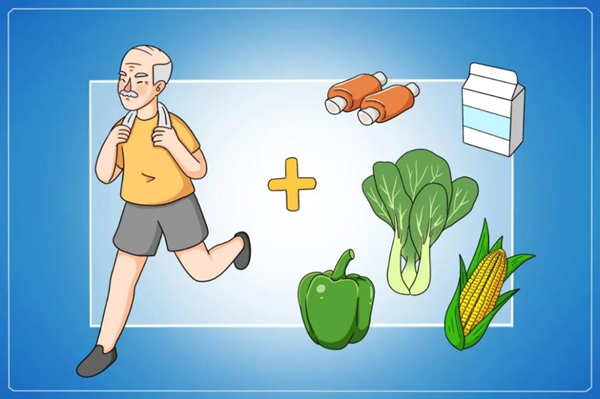Dietary guidelines for seniors
A balanced and healthy diet is essential for seniors to maintain well-being, delay aging and reduce geriatric syndrome.
On the basis of the eight key recommendations from its Dietary Guidelines for Chinese Residents (2022), the Chinese Nutrition Society has formulated supplementary instructions for special groups such as seniors (aged 65-79) and older seniors (aged above 80).
Here are some dietary tips for seniors highlighted in the document.

Seniors (aged 65-79)
1.Eat diversified and balanced meals
It is advisable to eat 12 different types of foods daily and at least 25 different types of foods weekly.
In addition to rice, noodles and steamed bread, coarse grains such as millet, buckwheat and corn can also be added as staple food.
A total daily intake of 50-150g of whole grains and legumes is recommended.
Vegetables should be included in every meal, and dark-colored vegetables should be preferred choices.
A daily intake of 200-350g of fresh fruits is recommended.
2.Eat plenty of animal-based foods and soybean products
Animal-based foods, which include poultry, eggs, seafood, dairy products and animal offal, make up for the lack of protein and fat in plant-based foods. Moreover, animal-based foods have sufficient high-quality protein content and high absorption and utilization rate of micronutrients, which can reduce the incidence of anemia and muscle attenuation. A daily intake of 120-150g of animal-based foods is recommended. Eating more fish can help seniors reduce the risk of Alzheimer's disease and cognitive dysfunction. Fish belly can be a favorable choice because it is soft, easy to digest and absorb, and its content of EPA and DHA is high, which is good for the regulation of blood lipids.
They should also eat more soy foods, such as tofu and dried tofu, which have a delicate taste and are rich in high-quality protein. It is recommended to consume different soybean products equivalent to 15g of soybeans on a daily basis.
3.Have meals with others, keep a good appetite, and take moderate exercises
Making and sharing meals with family members or friends enables seniors to keep a positive mood. Studies have found that having meals with others will decrease the risk of losing weight and muscle mass for seniors. Muscle wasting syndrome can lead to a decline in ability of daily activities and increased risk of falls in seniors, which is closely correlated with their mortality.
Seniors of all ages should take moderate exercises every day according to their abilities, and spend more time outdoors on sunny days.
4.Limit intake of table salt, cooking oil, added sugar and alcohol
Seniors often suffer from chronic diseases, so the intake of salt and fat should be limited as follows: salt not exceeding 5g, cooking oil no more than 25-30g.
Pay attention to the intake of "invisible salt", such as soy sauce, bean paste, bean curd and pickles, which have a high salt content.
Drink less or no alcohol.
Control the intake of added sugar. It is recommended to choose fewer or no processed foods that contain sugar, such as sweet drinks, cookies and cakes.
5.Regularly monitor the body condition to avoid malnutrition
Seniors, especially those with chronic diseases, are at a high risk of malnutrition, which will reduce their quality of life and increase disability rate among them. Nutritional evaluation is examination and evaluation conducted by professionals, including review of existing and past medical history, physical measurement, clinical physical examination, laboratory examination and targeted scale evaluation.
Once nutritional risks and deficiencies are found, dietary changes should be made in time, and nutritional supplements should be used as recommended by professionals when necessary.
Older seniors (aged above 80)
1.Eat high-quality, soft and diversified foods
It is recommended to choose high-quality, soft and diversified foods for older seniors, who are also encouraged to have meals with family and friends, participate in food preparation and family activities.
Have high-quality daily meals: 1 cup of milk, 1 egg and 1-2 kinds of staple food for breakfast; 1-2 kinds of staple food, 1-2 meat dishes, and 1-2 kinds of vegetables and bean products for lunch and dinner.
Extra intake of foods, such as dairy products, fruits and nuts, can supplement nutrition for the elderly. Due to the decline of chewing, swallowing and other functions, the elderly can choose such cooking methods as steaming, boiling, and stewing, use minced ingredients, and cook for a longer time, to make the foods easy to ingest.
2.Take moderate exercises
The elderly should exercise on a daily basis. The bedridden elderly can take resistance exercises with low load and intensity, such as using elastic balls or belts.
Resistance exercises can not only improve the physical function and muscle strength of elderly patients, but also improve their lung function. For those who are not bedridden, it is suggested that they reduce sedentary time. According to their own physical conditions, they can combine balance, aerobic and resistance exercises to delay or reduce muscle atrophy.
Mental activities are also important. The elderly can carry out intellectual activities such as reading and playing chess to delay cognitive decline.
Links
>
Copyright© Chinese Center for Disease Control and Prevention. All rights reserved.
京ICP备11024750号-1 京公网安备11011402013004号
京ICP备11024750号-1 京公网安备11011402013004号






